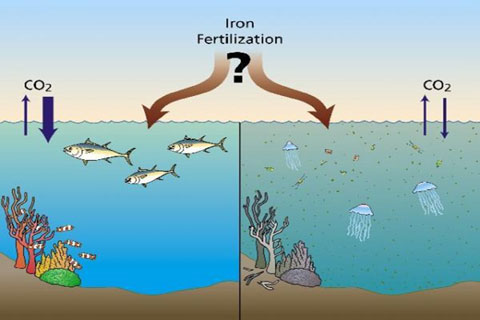'Fertilizing' for Vietnamese sea?
The Ministry of Natural Resources and Environment is studying the possibility of spreading iron powder - commonly known as a measure to stimulate the development of undersea plants - to the surface of Vietnamese sea.
This information was mentioned by Dr. Nguyen Chu Hoi, Deputy Director General of the General Department of Sea and Islands, said yesterday.
Around the world, the spread of iron powder to the sea is called 'oceanic fertilizer ' (ccean fertilizing), to restore the green belt, stimulate the development of marine vegetation, including phytoplankton. du, seaweed, sea grass, mangrove forest.
 Sprinkle iron powder on the sea surface to stimulate phytoplankton growth and capture atmospheric CO2. (Photo: Portsmouth / Sciencedaily University)
Sprinkle iron powder on the sea surface to stimulate phytoplankton growth and capture atmospheric CO2. (Photo: Portsmouth / Sciencedaily University)
According to scientists around the world, annual phytoplankton have helped reduce more than 50 billion tons of carbon through the absorption of carbon dioxide (CO2), a gas that contributes to global warming.
Oceanic ecosystems can capture carbonnic up to 30%. Scientists have been experimenting in Antarctica about ' fertilizing ' the ocean, by spraying some forms of iron isotopes and aluminum onto the surface. The results showed that micronutrient actually works to promote the proliferation of phytoplankton.
However, Hui notes that fertilizing the ocean may also have side effects, such as overgrowth of the phytoplankton, toxic algae outbreak.
So the method of ' fertilizing ' the ocean is causing much controversy for the scientific community. Many scientists believe that the accumulation of iron under the ocean has stimulated the development of algae and other ephemeral plankton. These organisms absorb carbon dioxide to grow, and thus benefit our atmosphere.
But some other scientists point out that it is the iron added to the ocean that can stimulate the algae to produce a neurotoxin. Toxic species and some other animals that eat algae will be poisoned.
- Techniques for fertilizing ornamental plants, ornamental flowers
- Featured Vietnamese portrait nearly 100 years ago
- Western Newspaper: 'Vietnamese food is very healthy!'
- Honoring Vietnamese Talents in 2014
- Development history of Vietnamese Ao Dai
- History and meaning of Vietnamese Women's Day October 20
- Vietnamese scientist won the
- For the first time, Vietnam has successfully built the Vietnamese genome
- The beauty of Vietnamese women in the past and now
- Readers are fluent in ancient Vietnamese words!
- Confirm the search for the second Vietnamese to fly into space
- Vietnamese scientist was honored by the President of Poland
 Is the magnetic North Pole shift dangerous to humanity?
Is the magnetic North Pole shift dangerous to humanity? Washington legalizes the recycling of human bodies into fertilizer
Washington legalizes the recycling of human bodies into fertilizer Lightning stone - the mysterious guest
Lightning stone - the mysterious guest Stunned by the mysterious sunset, strange appearance
Stunned by the mysterious sunset, strange appearance